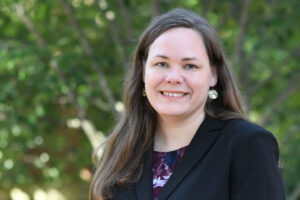Vanessa Doriott Anderson has joined The Graduate School as its assistant dean for academic and career development, with a focus on the future of work and graduate education at the University of North Carolina at Chapel Hill. Doriott Anderson, who holds a Ph.D. in Romance Studies (French) from Duke University, approaches her position supporting graduate students from a perspective of growth and potential. After completing her Ph.D. in 2012, she began her career at a rural liberal arts college in Iowa, where she taught French for three years.

“During that time, I realized I had transferrable skills,” she said. “I had been teaching for a long time. Teaching has enabled me to become a better communicator in general.”
As a first-generation college student, Doriott Anderson learned that she could still coach and mentor students and bring her expertise outside the bounds of a traditional faculty role.
“I had a wonderful research advisor, and I also knew that I was going to have to think about my career more broadly,” she said. “There’s this sense of you’ve been helped, and now you’re going to get to help others. … Your work has value; it took me a little while to understand what my degree means and what it enabled me to do.”
Dean Beth Mayer-Davis said the role allows for Carolina to stay at the forefront of innovation in both academics and in the non-academic workforce.
“The world of work is rapidly changing,” Mayer-Davis said. “Our team strives to support our graduate students so they are prepared and proactive in meeting the exciting challenges brought on by the future of work.”
Following her time as a graduate student at Duke and working in Iowa, Doriott Anderson took a position related to preparing future faculty before moving to North Carolina State University to support its professional development programming.
“North Carolina is my adopted state,” she said. “Working at a public institution is part of my commitment to service.”
At The Graduate School, Doriott Anderson will serve graduate students as director of the Graduate Student Center through career development workshops, targeted skill development opportunities, cross-campus collaborations, as well as credit-bearing professional development courses and oversight of the Graduate Certificate in Innovation, Leadership and Management. A significant effort will go toward supporting students’ exploration across the career spectrum, especially careers in non-academic settings where a majority of Carolina’s graduate students establish their careers.
“I’ve always defined success for graduate students in terms of their long-term satisfaction, including personal well-being, career well-being, feelings of ability, of competence, … feeling that they’re empowered and able to take on whatever challenge comes their way,” Doriott Anderson said.
She hopes to encourage graduate students to see value in their work—whether they’re conducting research in the humanities, in STEM, or otherwise.
“The horizon of challenge is always there,” she said. “You’re always a work in progress, but you have the power to direct which way you go next.”
